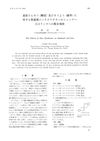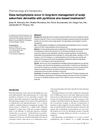August 2020 in “Prosiding Farmasi” Zinc pyrithione in shampoo effectively treats dandruff.
 December 2015 in “Dermatologic Therapy”
December 2015 in “Dermatologic Therapy” Zinc sulfate solution is more effective than tea lotion for treating acne rosacea.
February 2013 in “Journal of the American Academy of Dermatology” The zinc pyrithione hair care system improves scalp hydration and reduces water loss.
 June 2011 in “Journal of clinical and experimental investigations”
June 2011 in “Journal of clinical and experimental investigations” Oral zinc sulphate is an effective and safe treatment for thallium poisoning.
 April 1978 in “Pediatric research”
April 1978 in “Pediatric research” Patients with anorexia nervosa did not show a correlation between zinc levels and taste perception or the severity of their condition.
 January 1978 in “Yukagaku”
January 1978 in “Yukagaku” Zinc pyrithione in shampoo or rinse reduces dandruff and itching.
March 2023 in “International Journal of bioprinting” Zinc/silicon-infused hydrogel helps regenerate hair follicles.
 January 2022 in “Social Science Research Network”
January 2022 in “Social Science Research Network” A new patch that releases quercetin, copper, and zinc ions under the skin can effectively treat hair loss by promoting hair follicle regeneration.
 December 2020 in “Skinmed”
December 2020 in “Skinmed” Zinc levels are not significantly different in people with hair loss conditions like Androgenetic Alopecia and Alopecia Areata.
 January 2016 in “American Journal of Clinical and Experimental Medicine”
January 2016 in “American Journal of Clinical and Experimental Medicine” Lower zinc levels in hair are linked to more severe male pattern baldness, but blood zinc levels don't show this link. Age also increases baldness severity.
 57 citations,
August 2003 in “British Journal of Dermatology”
57 citations,
August 2003 in “British Journal of Dermatology” Minoxidil and pyrithione zinc combo most effectively increases hair density.
26 citations,
October 2011 in “Biological trace element research” Low copper levels might cause premature graying of hair.
 16 citations,
December 2008 in “International Journal of Dermatology”
16 citations,
December 2008 in “International Journal of Dermatology” Long-term use of pyrithione zinc shampoos remains effective for scalp seborrheic dermatitis, with decreased effectiveness likely due to not following treatment instructions rather than the treatment itself.
 8 citations,
April 2011 in “Surgery today”
8 citations,
April 2011 in “Surgery today” A substance called sodium zinc dihydrolipoylhistidinate can significantly reduce hair loss caused by chemotherapy in rats.
 4 citations,
January 2016 in “Dermatology online journal”
4 citations,
January 2016 in “Dermatology online journal” Using bacitracin zinc and selenium sulfide one after the other can temporarily turn white hair yellow.
 2 citations,
January 2014 in “Hair therapy & transplantation”
2 citations,
January 2014 in “Hair therapy & transplantation” Using 5% Minoxidil solution with oral chelated zinc supplement can effectively treat female pattern hair loss.
 1 citations,
January 2023 in “International journal of urology”
1 citations,
January 2023 in “International journal of urology” Low zinc levels are linked to low testosterone but not to sexual problems.
1 citations,
January 2017 in “Hair therapy & transplantation” Topical zinc-thymulin is safe and effective for treating male pattern baldness.
 January 2024 in “Frontiers in plant science”
January 2024 in “Frontiers in plant science” The zinc finger protein 3 in Arabidopsis thaliana reduces plant growth and root hair development.
4 citations,
October 2011 in “Medical journal of Tabriz University of Medical Sciences and Health Services” 1 citations,
October 2021 in “Journal of Cosmetic Dermatology”  February 2024 in “International journal of pharmaceutical sciences and nanotechnology”
February 2024 in “International journal of pharmaceutical sciences and nanotechnology” Nanocarriers in gel may reduce side effects of oral hair loss treatments.
 195 citations,
April 2005 in “Journal of biological chemistry/The Journal of biological chemistry”
195 citations,
April 2005 in “Journal of biological chemistry/The Journal of biological chemistry” The ZIP7 gene helps control zinc levels in cells by moving zinc from the Golgi apparatus to the cytoplasm.
February 2023 in “El-Minia Medical Bulletin”  39 citations,
September 2013 in “Journal of Cosmetic Dermatology”
39 citations,
September 2013 in “Journal of Cosmetic Dermatology” Herbs can potentially treat hair loss by inhibiting a key enzyme and promoting hair growth, and deficiencies in zinc, biotin, and iron are linked to hair loss.
 30 citations,
January 2013 in “International Journal of Trichology”
30 citations,
January 2013 in “International Journal of Trichology” The most common causes of hair loss in Jordanian children are fungal infections, autoimmune hair loss, and hair shedding after fever, with zinc deficiency also being a notable cause.
28 citations,
September 1986 in “Pediatric dermatology” Zinc therapy improved hair health in a girl with acrodermatitis enteropathica.
23 citations,
February 2017 in “Journal of dermatology” Low serum levels of zinc and selenium may increase the risk of alopecia areata.
19 citations,
July 2004 in “Journal of Medical Primatology” Infant baboons suffered from zinc poisoning due to poor cage conditions.
17 citations,
August 2010 in “International Journal of Cosmetic Science” Orthosiphon stamineus leaf extract reduces oily skin and improves complexion better than zinc gluconate.

















